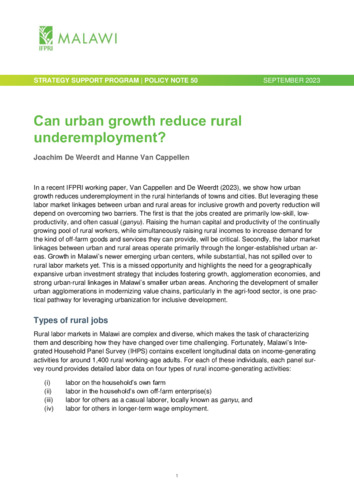Can urban growth reduce rural underemployment?
Abstract
In a recent IFPRI working paper, Van Cappellen and De Weerdt (2023), we show how urban growth reduces underemployment in the rural hinterlands of towns and cities. But leveraging these labor market linkages between urban and rural areas for inclusive growth and poverty reduction will depend on overcoming two barriers. The first is that the jobs created are primarily low-skill, low productivity, and often casual (ganyu). Raising the human capital and productivity of the continually growing pool of rural workers, while simultaneously raising rural incomes to increase demand for the kind of off-farm goods and services they can provide, will be critical. Secondly, the labor market linkages between urban and rural areas operate primarily through the longer-established urban areas. Growth in Malawi’s newer emerging urban centers, while substantial, has not spilled over to rural labor markets yet. This is a missed opportunity and highlights the need for a geographically expansive urban investment strategy that includes fostering growth, agglomeration economies, and strong urban-rural linkages in Malawi’s smaller urban areas. Anchoring the development of smaller urban agglomerations in modernizing value chains, particularly in the agri-food sector, is one practical pathway for leveraging urbanization for inclusive development.

